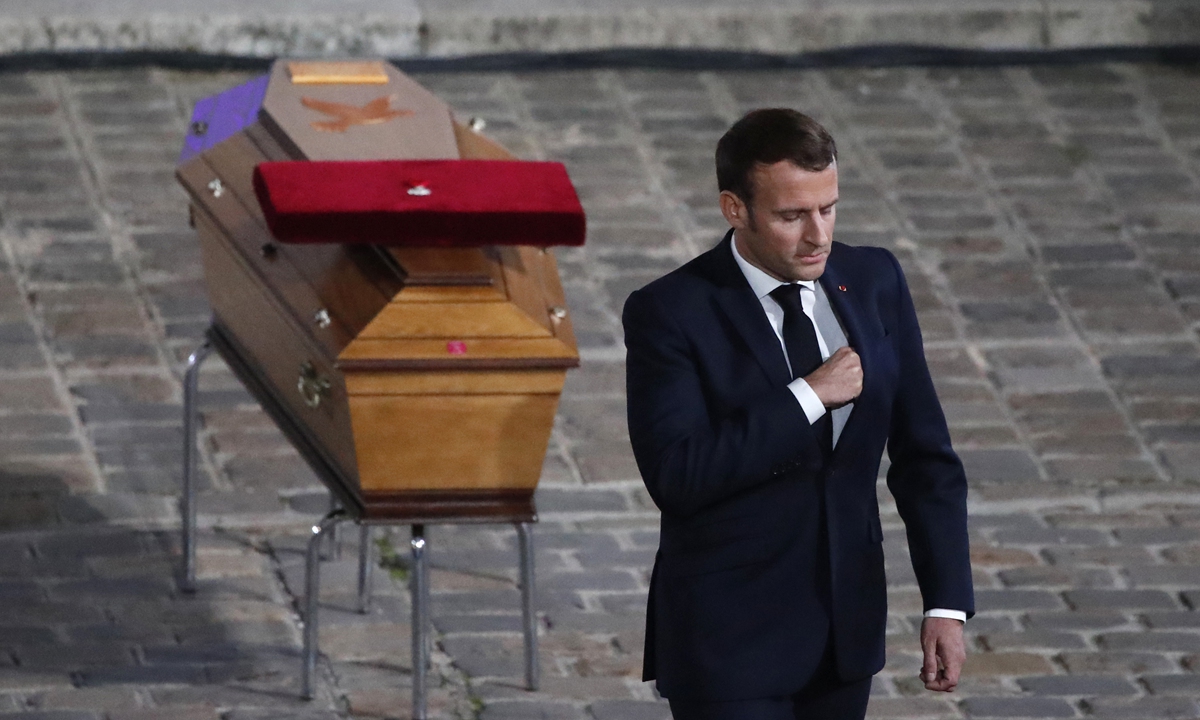West can learn to cope with extremism from others
By GLobal Times Source: Global Times Published: 2020/10/26 21:47:15

French President Emmanuel Macron pays his respects by the coffin of Samuel Paty in Paris on Wednesday during a national homage to the French teacher, who was beheaded in broad daylight outside his school. Seven people, including two schoolchildren, will appear before an anti-terror judge for a decision on criminal charges over the killing of the 47-year-old teacher. Photo: AFP
Editor's Note:
After a Paris history teacher was beheaded for showing caricatures of the Prophet Muhammad during a class discussion on freedom of speech, France is now launching a campaign championed by President Emmanuel Macron to protect France's secular values against radical Islam. How might France's de-radicalization efforts be viewed? Can China's de-radicalization experience provide a reference? The Global Times asked two Chinese scholars for their perspectives.
Wang Shuo, deputy director and research professor of the Institute of European Studies at the China Institutes of contemporary International Relations
Over the past few years, there have been frequent terrorist attacks related to Islam in France. Multi-cultural countries with religious pluralism all face challenges of how to keep different groups in a harmonious state of affairs. France is no exception. Starting with the Charlie Hebdo shooting spree in 2015, cultural and religious conflicts in France are becoming increasingly intensified.
Since the financial crisis, the gap between the rich and the poor in France has widened, with many social issues deepening. Religious and racial conflicts are intertwined with social problems. For example, one may find it difficult to get a job in France if he professes to be a Muslim.
Although France has always wanted to maintain a more open and inclusive environment, it faces a conundrum: How to sustain cultural diversity and classical secular values at the same time? This is a serious paradox. France has not found a good way to guarantee the coexistence of multiple religions and secular values.
There are many Muslim immigrants in France. Dealing with the contradictions between their religious beliefs and secular values of France confronts immigrants, established society and the government itself. Governance in particular is no easy task.
All governments are faced with challenges to eliminate extremism. Every country needs to manage daunting hurdles to counter corresponding religious terrorism. At this moment, France is launching a de-radicalization campaign. If it works well, other countries can learn from France's experience. Hopefully, they will not make similar mistakes should any arise.
In terms of de-radicalization, the West can also learn lessons from others. First of all, the West cannot look at this issue through tinted lenses or with double standards. When Western countries suffer terrorist attacks or are plagued by religious extremism, China has always shown sympathy or support. But when China encounters similar problems, the West uses a double standard to judge China. This is unfair and immoral.
It's difficult for merely one country to solve the problem of terrorism, especially at a time when extremism and international terrorist organizations are spreading around the world. International cooperation is needed. Extremism and terrorism cannot be defeated by simply relying on one country to weed it out. In this aspect, there are many common grounds for China and the Europe to deepen cooperation and conduct more communications to safeguard humanity.
Gao Jian, a scholar at Shanghai International Studies University
Beheading is an extremist act that should be strongly condemned and opposed. Over the past five years France has witnessed repeated terrorist attacks linked to Islam. Many in the Islamic world feel that the Western secular and liberal culture does not respect their values
Macron in recent days has spoken out to forcefully defend the secular values of the French Republic and fight radical Islam. Macron said France "will not give up our cartoons" and described Islam as a religion "in crisis" worldwide. France's approach will bring great uncertainties to social stability for the whole Europe. Objectively speaking, France is unable to effectively prevent Islamic radicalization with its current social governance ability.
When it comes to de-radicalization, China has a clear distinction, though. China firmly cracks down on Islamic extremist terrorists who are engaged in separatist activities and seek so-called political independence. Meanwhile, as a diverse and multi-ethnic country, China attaches great importance to the culture of ethnic minorities, their right of development, and gives them respect. China respects their freedom of religion. China is quite cautious when talking about Muslim and Islamic civilization, and avoids irritating sensitive points of Islamic culture.
Western civilizations must realize the importance of mutual respect between different cultures and deal with religious, ethnic conflicts in a practical and cool-headed manner.
Posted in: VIEWPOINT